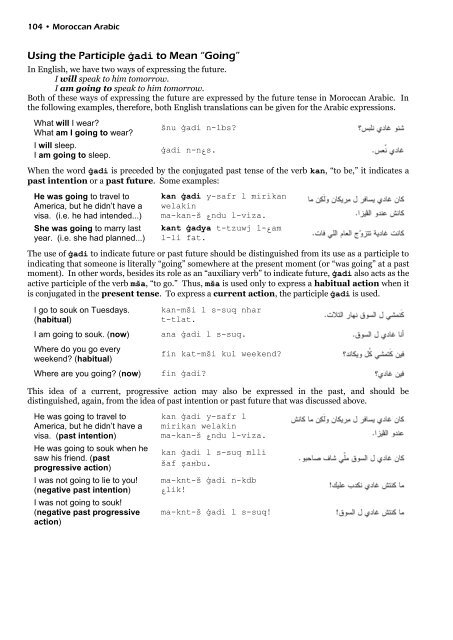Moroccan Arabic textbook 2011
Moroccan Arabic textbook 2011
Moroccan Arabic textbook 2011
Create successful ePaper yourself
Turn your PDF publications into a flip-book with our unique Google optimized e-Paper software.
104 • <strong>Moroccan</strong> <strong>Arabic</strong><br />
Using the Participle ġadi to Mean “Going”<br />
In English, we have two ways of expressing the future.<br />
I will speak to him tomorrow.<br />
I am going to speak to him tomorrow.<br />
Both of these ways of expressing the future are expressed by the future tense in <strong>Moroccan</strong> <strong>Arabic</strong>. In<br />
the following examples, therefore, both English translations can be given for the <strong>Arabic</strong> expressions.<br />
What will I wear<br />
What am I going to wear<br />
I will sleep.<br />
I am going to sleep.<br />
šnu ġadi n-lbs<br />
ġadi n-nعs.<br />
When the word ġadi is preceded by the conjugated past tense of the verb kan, ―to be,‖ it indicates a<br />
past intention or a past future. Some examples:<br />
He was going to travel to<br />
America, but he didn‟t have a<br />
visa. (i.e. he had intended...)<br />
She was going to marry last<br />
year. (i.e. she had planned...)<br />
kan ġadi y-safr l mirikan<br />
welakin<br />
ma-kan-š nduع l-viza.<br />
kant ġadya t-tzuwj l-عam<br />
l-li fat.<br />
The use of ġadi to indicate future or past future should be distinguished from its use as a participle to<br />
indicating that someone is literally ―going‖ somewhere at the present moment (or ―was going‖ at a past<br />
moment). In other words, besides its role as an ―auxiliary verb‖ to indicate future, ġadi also acts as the<br />
active participle of the verb mša, ―to go.‖ Thus, mša is used only to express a habitual action when it<br />
is conjugated in the present tense. To express a current action, the participle ġadi is used.<br />
I go to souk on Tuesdays.<br />
(habitual)<br />
I am going to souk. (now)<br />
Where do you go every<br />
weekend (habitual)<br />
Where are you going (now)<br />
kan-mši l s-suq nhar<br />
t-tlat.<br />
ana ġadi l s-suq.<br />
fin kat-mši kul weekend<br />
fin ġadi<br />
This idea of a current, progressive action may also be expressed in the past, and should be<br />
distinguished, again, from the idea of past intention or past future that was discussed above.<br />
He was going to travel to<br />
America, but he didn‟t have a<br />
visa. (past intention)<br />
He was going to souk when he<br />
saw his friend. (past<br />
progressive action)<br />
I was not going to lie to you!<br />
(negative past intention)<br />
I was not going to souk!<br />
(negative past progressive<br />
action)<br />
kan ġadi y-safr l<br />
mirikan welakin<br />
ma-kan-š nduع l-viza.<br />
kan ġadi l s-suq mlli<br />
šaf sạнbu.<br />
ma-knt-š ġadi n-kdb<br />
!likع<br />
ma-knt-š ġadi l s-suq!


